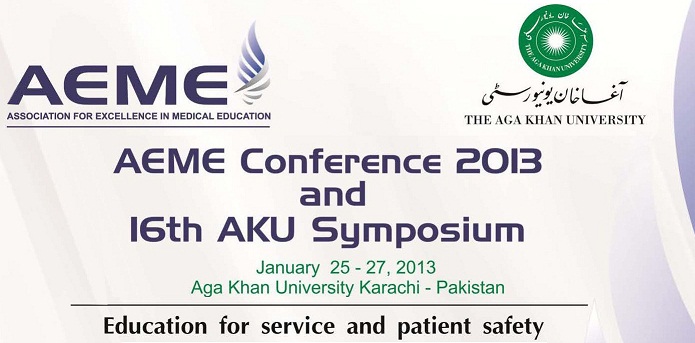Day 2 : Poster Presentations (Theme: Evaluation & Assessment)
Effectiveness of a course on research methodology in a Pediatric residency program
Location
Auditorium Pond Side
Start Date
27-1-2013 8:30 AM
Abstract
Introduction: Clinical research has been discussed for more than a decade. Little is done to make research methodology as a core curriculum for residency programs, especially in developing countries. The department of pediatrics at the Aga Khan University, Pakistan, started a course on child health research methods in 2010 and we report the improvement in knowledge of the residents as a result of introduction of this course
Methods: A one year course with fortnightly sessions to provide an overview of how to plan and conduct a research project. Major topics included identifying research questions, techniques of literature search, basic principles of research methods, types of study designs, measures of disease frequency and association, protocol and questionnaire development, ethical issues involved in human subject research, and data and bibliography management. For the assessment of impact, the Pretest-Posttest Design was used.
Results: Thirty six percent residents were able to correctly identify the type of variable and 26% chose the correct study design for the given scenarios in the pre-intervention phase which improved to 55% and 45% respectively. Forty one percent of the residents answered questions related to bias correctly before intervention which improved to 50% in the post intervention. Correct response to informed consent and vulnerable population improved from 75% to 83%. There was no improvement in knowledge of basis biostatistics
Conclusions: A research methodology course in the residency curriculum improves awareness and understanding of young postgraduate trainees in basic epidemiology
Effectiveness of a course on research methodology in a Pediatric residency program
Auditorium Pond Side
Introduction: Clinical research has been discussed for more than a decade. Little is done to make research methodology as a core curriculum for residency programs, especially in developing countries. The department of pediatrics at the Aga Khan University, Pakistan, started a course on child health research methods in 2010 and we report the improvement in knowledge of the residents as a result of introduction of this course
Methods: A one year course with fortnightly sessions to provide an overview of how to plan and conduct a research project. Major topics included identifying research questions, techniques of literature search, basic principles of research methods, types of study designs, measures of disease frequency and association, protocol and questionnaire development, ethical issues involved in human subject research, and data and bibliography management. For the assessment of impact, the Pretest-Posttest Design was used.
Results: Thirty six percent residents were able to correctly identify the type of variable and 26% chose the correct study design for the given scenarios in the pre-intervention phase which improved to 55% and 45% respectively. Forty one percent of the residents answered questions related to bias correctly before intervention which improved to 50% in the post intervention. Correct response to informed consent and vulnerable population improved from 75% to 83%. There was no improvement in knowledge of basis biostatistics
Conclusions: A research methodology course in the residency curriculum improves awareness and understanding of young postgraduate trainees in basic epidemiology

